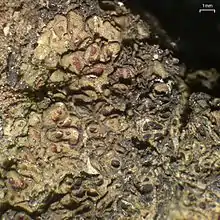Heppia
Heppia is a genus of olive, brownish, gray, or blackish squamulose, crustose, or peltate like lichens.[2] Heppia was once the type genus of the family Heppiaceae, but that family was folded into synonymy with Lichinaceae.[3]
| Heppia | |
|---|---|
 | |
| Heppia lutosa | |
| Scientific classification | |
| Domain: | Eukaryota |
| Kingdom: | Fungi |
| Division: | Ascomycota |
| Class: | Lichinomycetes |
| Order: | Lichinales |
| Family: | Lichinaceae |
| Genus: | Heppia Nägeli ex A.Massal. (1854) |
| Type species | |
| Heppia adglutinata (Kremp.) A.Massal. (1854) | |
| Synonyms[1] | |
The genus name of Heppiella is in honour of Johann Adam Philipp Hepp (1797–1867), a German physician and lichenologist.[4]
The genus was circumscribed by Carl Wilhelm von Nägeli and Abramo Bartolommeo Massalongo in Geneac. Lich. (Verona) 7-8 in 1854.
Description
Heppia species grow on rock or soil in arid sites around the world, in habitats similar to those favored by Peltula, which is similar but has a different cyanobacterium as the photobiont.[2] It lacks a medulla that is separate from the photobiont layer.[2] It is a cyanolichen with the photobiont cyanobacterium being Syctonema (or Syctonema-like).[2] The lower surface is paler than upper surface, and has numerous rhizoidal hyphae attaching it to the substrate.[2] The fruiting structures (ascomata) are apothecias immersed in the thallus with red to red-brown urn shaped (urceolate) to flat or slightly convex discs.[2] An exciple may or may not be present.[2]
Species
- Heppia adglutinata A.Massal. (1854)
- Heppia arenacea M.Schultz (2005)
- Heppia conchiloba Zahlbr. (1902)
- Heppia despreauxii (Mont.) Tuck. (1872)
- Heppia lutosa (Ach.) Nyl. (1869)
References
- "Synonymy: Heppia Nägeli ex A. Massal". Species Fungorum. CAB International. Retrieved 2014-10-31.
- Lichen Flora of the Greater Sonoran Desert Region. Vol 1, Nash, T.H., Ryan, B.D., Gries, C., Bugartz, F., (eds.) 2001,
- Schultz, Matthias; Büdel, Burkhard (2003). "On the systematic position of the lichen genus Heppia". The Lichenologist. 35 (2): 151–156. doi:10.1016/s0024-2829(03)00019-7. S2CID 85595474.
- Burkhardt, Lotte (2022). Eine Enzyklopädie zu eponymischen Pflanzennamen [Encyclopedia of eponymic plant names] (pdf) (in German). Berlin: Botanic Garden and Botanical Museum, Freie Universität Berlin. doi:10.3372/epolist2022. ISBN 978-3-946292-41-8. S2CID 246307410. Retrieved January 27, 2022.